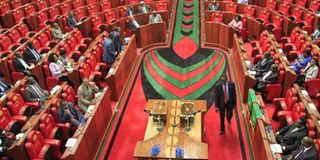Bill opening up public access to govt records ready for assent

Parliament in session. The National Assembly on August 16, 2016 approved the Senate's amendments to the Access to Information Bill, which would open government records to public scrutiny. FILE PHOTO | NATION MEDIA GROUP
What you need to know:
- The Bill was sponsored by Nyeri Woman Rep Priscilla Nyokabi.
- Among the amendments by the Senate is a provision to have information held by a public entity or private body provided “expeditiously at a reasonable cost”.
- Bill strikes a balance between opening up access to information and protecting that which is considered too sensitive or of strategic national importance.
The National Assembly on Tuesday approved the Senate’s changes to a Bill that seeks to open up access to government records and make it easier to get hold of information previously protected under the veil of secrecy.
This means that the Bill will now be presented to President Uhuru Kenyatta for his signature.
The Access to Information Bill was sponsored by Nyeri Woman Rep Priscilla Nyokabi, who told the Nation on Tuesday that there would not be the usual push and pull between the National Assembly and the Senate as both Houses had agreed on the proposed law.
“Most of what the Senate introduced were clarifications on language as opposed to new principles. There was nothing to disagree on as they were also making sure the legislation is easier to implement. They did a clean-up,” she said.
The Bill is among those with an August 27 deadline, the sixth anniversary of the promulgation of the Constitution.
Among the amendments made by the Senate is a provision to have information held by a public entity or private body provided “expeditiously at a reasonable cost”.
The Bill strikes a balance between increasing access to information and protecting what is considered too sensitive or of strategic national importance.
DORMANT WEBSITES
The law encourages a proactive approach in providing information, meaning that the government’s usually dormant websites will be kept updated with information that should be readily available.
According to the law, information that could undermine national security, endanger the life or safety or a person, involve the invasion of privacy, damage commercial interests or damage the government’s ability to manage the economy will not be released.
Also exempt from disclosure is information on military strategy, doctrine, capacity or deployment, foreign government information with implications on national security, and scientific or economic matters relating to national security.
But all the information considered important and of public interest will be open to be released to the people.
People who disclose information that is supposed to be kept secret will be liable to a fine of up to Sh1 million or a maximum three years in prison, or both.
However, the law protects whistle-blowers or those who release to the public information they hold because of their position by stating that they would not be punished as long as the disclosure is in the public interest.
“A disclosure which is made to a law enforcement agency or to an appropriate public entity shall be deemed to be made in the public interest,” the law states.





